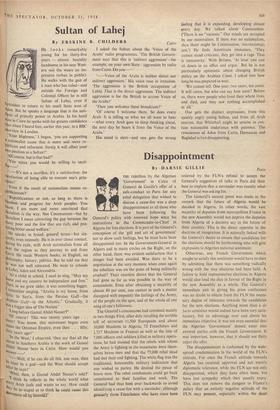Sultan of Lahej
By ERSKINE
HE looks remarkably young for his thirty-five years — almost boyishly handsome in his neat West- ern suit (he wears an im- pressive turban in public). He walks with the gait of a man who has ruled—and outside the Foreign and Colonial. Offices he is still forbidden to return to his small State west of thesis of princely power in Arabia. In his hotel interview in London. Aden. But he speaks a language that is the anti- Stlite in Cairo he spoke with far greater confidence Ulan when I heard him, earlier this year, in a BBC Sultan of Lahej, even if Your Highness,' I began, 'you are supporting a nationalist cause that is more and more re- Publican and reformist. Surely it will affect your Own position as a Sultan?'
Of course, but is that bad?'
You mean you would be willing to sacri- ace --It's not a sacrifice, it's a satisfaction; the satisfaetiOn of being able to execute one's prin- ciples!'
'Even if the result of nationalism means re- publicanism?'
'Republicanism or not, so long as there is freedom and progress for Arab peoples. You ktlow, I am more and more convinced that Socialism is the way. Not Communism—but by Secialism I mean correcting the gap between the many poor and the few that are rich, and pro- Viding better social welfare.'
He speaks in broad, general terms—but sin- ,icerelY, even intensely. He is in ever closer contact, his exile, with Arab nationalists from all over the region as they journey to and from C`tir0. He reads Western books, in English, on philosophy, history, politics. But he told me that he was not well educated. He went to schools Aden and Alexandria.
As a child in school, I used to sing, "May my h0t1e and my country be independent and free." then, as we grew older, it was something bigger. „ remember singing, "Arabia is my home, from ‘)Yria to San'a, from the Persian Gulf—the Arabian Gulf—to the Atlantic." Gradually, it was a bigger idea of The Nation.' 'Long before Gamal Abdel Nasser?'
Of course! This was twenty years ago . . . 111°re! You know, this movement began even Under the Ottoman Empire, even then . . . fifty, sixty Years ago!' 'In the West,' I observed, 'they say that all the 1111rest in Southern Arabia is the work of Gamal Abdel Nasser here in Cairo. How would you b ----Well, if he can do all this, one man, then e must be a god—and the West should accept What he says!' 'What, then, is Gamal Abdel Nasser's role?' think he reflects to the whole world what !,v_erY Arab feels and wants to say. How could they be so stupid as to think he could cause this kovethent all by himself?' I asked the Sultan about the 'Voice of the Arabs' radio programmes. 'The British Govern- ment says that this is 'indirect aggression'—for example, on your own State : aggression by radio from Cairo. Do you—' '—Voice of the Arabs is neither direct nor indirect aggression.' His voice rose in irritation. 'The aggression is the British occupation of Lahej. That is the direct aggression. The indirect aggression is for the British to accuse Voice of the Arabs!'
'Then you welcome these broadcasts?'
'Of course I welcome them. So does every Arab. It is telling us what we all want to hear —what every Arab goes to sleep thinking about, the next day he hears it from the Voice of the Arabs.'
His mind is alert—and one gets the strong feeling that it is expanding, developing almost every day. We talked about Communism. (There is no "vacuum." Our minds are occupied by our nationalism. If there was no nationalism, then there might be Communism, international- ism.') He finds Americans immature. 'They cannot stand criticism; they get into a rage. That is immaturity.' With Britons, 'At least you can sit down in an office and argue.' But he is not particularly optimistic about changing British policy on the Arabian Coast. 1 asked him how long he was prepared to wait.
'We cannot tell. One year, two years, ten years. It will come, but who can say how soon? Before us, there were people who lived their whole lives, and died, and they saw nothing accomplished at all.'
One gets the distinct impression, from this quietly angry young Sultan, and from all Arab sources, that Whitehall might be unwise to con- fuse nationalist endurance with patience. The remoteness of Aden from Cairo, Damascus and Baghdad is fast disappearing.


































 Previous page
Previous page